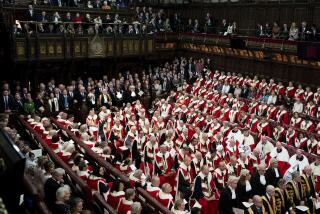75 Hereditary Peers Survive House Vote
- Share via
LONDON — Seventy-five hereditary peers in Britain’s House of Lords won a stay of execution Friday as the vast majority of the nation’s aristocracy resigned themselves to political oblivion.
“I suppose I am headed for the scrap heap of history,” one elderly peer said, sighing as he lined up for a list of the names of those who survived an unprecedented internal election.
By a quirk of history, the results were announced on Guy Fawkes Day, the anniversary of a Roman Catholic plot to blow up Parliament with barrels of gunpowder Nov. 5, 1605.
There were glum faces among the Conservatives on the red leather benches of the Lords as a bewigged clerk read out the names of those who will remain on a transitional basis, and there were murmurs of approval for popular favorites.
The House of Lords has an advisory and consultative role in Parliament.
The vast majority of the more than 750 hereditary peers will lose the right to sit and vote beginning next week under a reform bill pushed through by Prime Minister Tony Blair’s Labor government.
The lucky 75 chosen by their fellows will join 17 officeholders and a handful of other hereditary peers who have been offered the chance to stay on as life peers.
There are about 500 other life peers, appointed by governments during the past 40 years, whose positions are unaffected.
The winners announced Friday comprised 42 opposition Conservatives, two members of the Labor Party, three Liberal Democrats and 28 “cross benchers” who are not aligned with any party.
Among the Conservatives to survive, the most popular was 70-year-old Earl Ferrers, who won 190 of the 204 votes cast.
Other Conservatives on the list were the Earl of Onslow, who once memorably threatened to behave like a soccer hooligan in protest, and Baron Mowbray, a 76-year-old World War II veteran with an eye patch whose title goes back to 1283.
It was a subdued election campaign in which candidates were limited to submitting manifestoes, or platforms, of 75 words or less.
One of the losers, Lord Monckton, had called, in his manifesto, for the muzzling of all cats, to protect birds.
More to Read
Sign up for Essential California
The most important California stories and recommendations in your inbox every morning.
You may occasionally receive promotional content from the Los Angeles Times.











